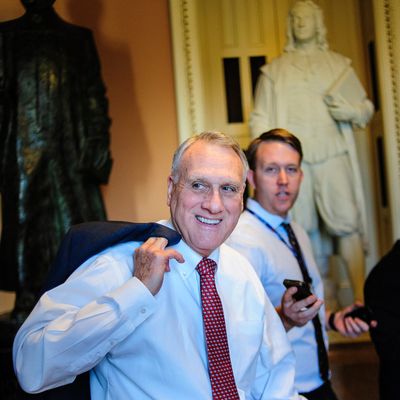
Former senator Jon Kyl will inherit John McCain’s seat in the upper chamber. On Tuesday, Arizona governor Doug Ducey decided to return the 76-year-old Republican to the Senate, in a move that will strengthen Mitch McConnell’s caucus in the short term — but just might weaken it in the long run.
Appointing McCain’s replacement was a tricky task for Ducey, as it required him to balance several competing concerns. The Arizona GOP is sharply divided between a Trumpist majority, and a more “Flake-y” fringe. By picking a “caretaker” replacement — i.e., someone who would not seek reelection in 2020 — Ducey could avoid alienating either contingent, and allow Republican primary voters a chance to choose the seat’s long-term occupant. And yet, that option would also increase the risk of a Democrat swiping the seat in the near-future, since (all else being equal) it’s harder to beat an incumbent than to win an open race. In a similar conundrum, Ducey could have potentially strengthened his prospects for reelection this fall by choosing a relative “moderate” to take McCain’s place – or fortified his résumé for a future presidential run by doing right by the GOP’s activist base.
The Kyl pick could allow Ducey to have his uncontroversial caretaker – and his long-term, far-right Senate appointment, too. According to the New York Times, Kyl “has only committed to serving until the start of the next Congress, in January.” In other words, Kyl might serve just long enough to provide McConnell with a spare vote for confirming Brett Kavanaugh to the Supreme Court (before his appointment, Kyl was leading the outside lobbying effort to secure Kavanaugh’s confirmation) — and then step down, thereby allowing a newly reelected governor Ducey to put a younger, more ambitious conservative in his place.
That said, Kyl has not ruled out remaining in the seat until 2020. And if he does choose to stay, the GOP would (almost certainly) forfeit the advantage of incumbency when defending that seat during the next presidential election.
Kyl served three terms in the Senate before retiring in 2013. For much of the time since, he’s been working as a lobbyist at Covington & Burling. He is expected to immediately (if, perhaps, temporarily) cut ties with his existing clients.






























